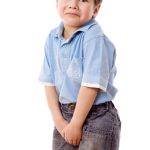 A developmental problem, characterized by the repeated voluntary or involuntary defecation into clothing or in other inappropriate places, occurring in children ages 4 years and older.
A developmental problem, characterized by the repeated voluntary or involuntary defecation into clothing or in other inappropriate places, occurring in children ages 4 years and older.
A disorder in which, through faulty control of the sphincters, a person repeatedly defecates in his or her clothing after an age at which continence is expected.
Faecal incontinence not associated with a physical condition or disease.
Encopresis involves the repeated passage of feces into inappropriate places (e.g., clothing or the floor), whether involuntarily or intentional. It is differentiated into either primary or secondary subtypes: the primary subtype indicates that the individual has never established fecal continence, whereas the secondary subtype indicates the disturbance developed after a period of established continence. Encopresis may stem from psychological reasons such as anxiety about defecating in a public place, a more generalized anxiety, or oppositional behavior or may be caused by physiologically induced dehydration related to hypothyroidism, a febrile illness, or a side effect of medications. Secondary encopresis may begin following a stressful event, such as the birth of a sibling, the beginning of school, or separation from a parent due to divorce or death.
Inability to fully control bowel movements, deliberate holding in of feces, or defecation somewhere other than in a toilet. Encopresis generally refers to otherwise physically normal children who have passed the usual age by which bowel control is normally achieved (not those with physical handicaps causing incontinence). Since bowel movements are generally easier for young children to control than urination, encopresis is much rarer than enuresis, or bedwetting. An occasional “accident,” especially when a child has diarrhea, may occur in a child who normally has bowel control, and many young children go through a brief period of resisting use of the toilet for defecation; but encopresis refers to persistent problems involving defecation in diapers, underpants, in “private places” such as corners in short, at times and places other than adults wish.
Condition, not caused by physical illness or defect, in which the passing of feces occurs without control.
Repeated passage of stool into the clothing in a child older than age five in the absence of gastrointestinal illness or disability.
Also known as soiling, a disorder in which children older than age 4 involuntarily pass feces into their clothing. Primary encopresis refers to the disorder in which the child has not yet achieved bowel control. Secondary encopresis occurs when a child who has previously established control loses it. Encopresis is most commonly caused by chronic constipation. Less commonly, it may be associated with an underlying medical condition such as an inadequate level of thyroid hormone or a weakness of the intestinal muscles.
Incontinence of feces. The term is used for fecal soiling associated with psychiatric disturbance.
A condition associated with constipation and fecal retention in which watery colonic contents bypass the hard fecal masses and pass through the rectum. This condition is often confused with diarrhea.
Irregularities in bowel movements that may arise due to stress or fear.
This refers to a form of soiling where children, past the age of attaining bowel control, defecate in inappropriate places. Such a behavior is typically indicative of an underlying behavioral issue.
